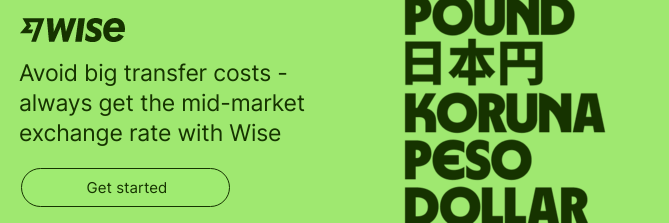What do you need to receive money with Western Union?
Receiving money through Western Union? Learn about the process, from cash pick-up to bank transfers, and find out what to expect.

Sometimes, life calls for a significant transfer of money. Whether you’re buying a new car, making a big family purchase, or putting down a deposit on the house of your dreams, you’ll want a service that can handle the transaction quickly and affordably.
In this guide, we’ll focus on one of Ireland's leading financial institutions, Bank of Ireland, and explore how it manages large transfers, including the steps involved and any limits to be aware of.
Plus, we’ll introduce Wise as a solution for sending high amounts seamlessly and without hidden fees.
Wise: Send money to
160+ countries 🌎

Unfortunately, the Bank of Ireland places restrictions on the amount of money you can transfer out of your bank account independently. These limits effectively mean you can’t make large transfers with Bank of Ireland online or using phone banking.
Instead, you have to complete a form and visit a branch to have the payment processed by a customer service representative.¹
Bank of Ireland applies a combined maximum daily transfer limit of €20,000 to online and 365 phone banking.¹ This means every time you make a payment what’s left of your daily limit reduces.
There is also an additional limit placed on new payees. It is a combined daily limit of €1000, which applies for up to 48 hours after they’ve been added to your profile. This might sound a little odd, but it’s just a fraud protection measure put in place by BOI.
There are some types of payment you can do that are excluded from the daily €20,000 BOI transfer limit¹:
- Transfers done between your own Bank of Ireland accounts
- Credit card payments
- Debit card payments
- Direct debits and standing orders.
It’s not possible to increase your maximum transfer amount online with the Bank of Ireland, but you can decrease it if you want to.¹ All you need to do is go to the payment section of the BOI app or 365 online portal, where you can check your current limit and change the settings to lower it.
How long a Bank of Ireland transfer takes depends on where the money is going and what time it was sent. Here’s a look at what you can generally expect:
| BOI Payment Type | Timeframe² |
|---|---|
| Transfer between your BOI accounts | Instant |
| BOI Bill Payments feature | One working day when sent before 3.30pm |
| Euro SEPA zone payments | One working day when sent before 2.30pm and covered by the Payment Services Regulations |
| International payments | Varies from as little as one working day based on the currency, destination country and cut off time |
Payments made after the cut off times are processed on the next working day instead.

If Bank of Ireland's options for large transfers don't suit your needs, you might want to explore Wise as an alternative. To start, Wise gives you significantly higher transfer limits:
- To Euro: Send up to 6 million EUR per transfer.
- From Euro: Send up to 1.2 million EUR per transfer when paying via bank transfer.
On top of that, you’re provided with dedicated customer support for handling large transfers and have access to real-time tracking so you always know where your money is.
For international transfers, fees are often a deciding factor, and Wise stands out with its transparent pricing. You can easily view the rates and estimated delivery times on their website or app - there’s no hidden fees to worry about.
One of Wise's key benefits is its use of the mid-market exchange rate, the same rate you'd normally find on Google. For you this means there’s no extra markups or inflated margins, just a fair deal when currency conversion is involved.
Getting started on a large money transfer with Wise is straightforward. Just create a free account, follow the simple steps to set up your payment, and let Wise take care of the rest.
But of course, the transfer of the high amounts with Wise is subject to internal reviews and provision of additional documentation by the customer, when requested.
As mentioned before, to transfer a large sum from the Bank of Ireland you need to complete a form then visit a branch. The form is available on the website and to complete it you’ll need to provide some information, including³:
- Your Bank of Ireland ROI
- Information about the payee
- Payment details
- Your details
Once completed you need to submit the transfer application and write down the Application Reference Number (ARN) that appears on screen.
Next, head into your local branch and give an Advisor the ARN. They can then help you complete the transfer. Alternatively, if you’re a Premier customer you can call Priority Banking to complete this step.

Sources used:
Sources last checked on date: 17 December 2024
*Please see terms of use and product availability for your region or visit Wise fees and pricing for the most up to date pricing and fee information.
This publication is provided for general information purposes and does not constitute legal, tax or other professional advice from Wise Payments Limited or its subsidiaries and its affiliates, and it is not intended as a substitute for obtaining advice from a financial advisor or any other professional.
We make no representations, warranties or guarantees, whether expressed or implied, that the content in the publication is accurate, complete or up to date.

Receiving money through Western Union? Learn about the process, from cash pick-up to bank transfers, and find out what to expect.

Need to get money from abroad? Learn about the ways you can receive international transfers through An Post in Ireland..

Discover the best way to send money from Ireland to the UK for property purchases. Compare costs, timing, and methods for transferring money safely.

Looking to receive a payment through Remitly? Discover all the ways you can get your money in Ireland.

Discover how you can send money abroad with An Post and what fees and rates you'll need to pay.

Here’s our guide to what you need to know to make an international transfer with AIB, including what information you need, and the fees and rates you'll pay.